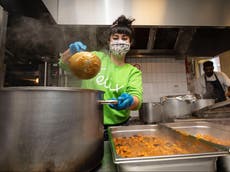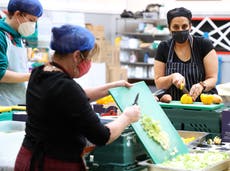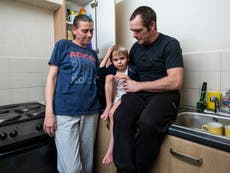Help the Hungry: ‘Dark kitchen’ to produce half a million meals a year as campaign’s lasting legacy
‘What we learned during Covid was that a lot of the social kitchens were forced to close because people literally couldn’t come together’, The Felix Project’s CEO tells Anna Davis

Your support helps us to tell the story
From reproductive rights to climate change to Big Tech, The Independent is on the ground when the story is developing. Whether it's investigating the financials of Elon Musk's pro-Trump PAC or producing our latest documentary, 'The A Word', which shines a light on the American women fighting for reproductive rights, we know how important it is to parse out the facts from the messaging.
At such a critical moment in US history, we need reporters on the ground. Your donation allows us to keep sending journalists to speak to both sides of the story.
The Independent is trusted by Americans across the entire political spectrum. And unlike many other quality news outlets, we choose not to lock Americans out of our reporting and analysis with paywalls. We believe quality journalism should be available to everyone, paid for by those who can afford it.
Your support makes all the difference.It is planned that one and a half million healthy, handmade ‘ready meals’ will be delivered to those in need every year as a lasting legacy of our Help the Hungry Campaign.
As we work towards reaching our £10m fundraising target this Christmas, we can reveal that it is intended that an outcome of this year’s extraordinary effort by Independent readers to help address food poverty among vulnerable people will be the creation of central London’s largest-ever social “dark” kitchen.
This will be a professional kitchen dedicated to making pre-prepared meals. It will have professional chefs and a team of up to 15 kitchen staff who will turn surplus food into nutritious ready-to-eat meals.
A kitchen is known in the food trade as a “dark” kitchen as it does not have diners who visit the site but rather takes the food and delivers it to them, in a manner similar to that used by the “dark” kitchens across the country set up by companies such as Deliveroo.
Our social “dark” kitchen will be run our appeal partner, The Felix Project, which is now the UK’s largest food redistribution charity. Ultimately, it is intended, it will produce 1.5 million meals a year for people who are unable to cook their own meals – the homeless, the elderly and children on free school meals who are not properly fed at home.
This will be achieved through the Felix Project’s distribution network of 600 charities and 120 schools in London, and alongside its core mission of collecting surplus food and delivering it to charities so they can provide it to the most vulnerable in society.
Mark Curtin, CEO of The Felix Project, said social, or community, kitchens across the capital shut down as a result of the pandemic, leaving many vulnerable people who relied on them for cooked meals stranded.
That is why, he said, the Help the Hungry social “dark” kitchen is so needed to step into this gap. Its creation as a result of our appeal will also allow the Felix Project to make use of much more surplus food than it currently does.
Since the first lockdown, Help the Hungry has worked with The Felix Project to supply food to charities and chefs using empty kitchens across the capital to make meals for the needy. But a dedicated social “dark” kitchen of its own will take that work to the next level.
Mr Curtin said: “What we learned during Covid was that a lot of the social kitchens were forced to close because people literally couldn’t come together. Many more people than usual were unable to access food. There was a need to provide more high-nutritional value meals that could be prepared easily at home. Something that can be packaged and distributed in a really agile way to as many people in as many different places as possible.”
Meals such as vegetable curry and rice, and risottos will be cooked, then blast chilled, and distributed to charities and other organisations that work with people in need.
Mr Curtin added that as a result of the pandemic a more diverse range of people have found themselves in food poverty. He said: “We will be providing people with something they can eat straight away, or they just need to reheat before eating.”
It is intended that food will be seasonal, which is better for the environment, and there are plans to set up a youth training programme to help address the issue of local youth unemployment.
Mr Curtin said that none of this would be possible without the Evening Standard readers and their donations. As we push this Christmas to hit our £10m target, it is projects like our social “dark” kitchen that will ensure their generosity leaves a lasting legacy to help those worst hit by the impact of the Covid-19 pandemic.
This November and December we will be delivering food directly to 1,000 people a day through our partner With Compassion. Please donate here to help us do all we can to ensure no one goes hungry this Christmas.




Join our commenting forum
Join thought-provoking conversations, follow other Independent readers and see their replies
Comments